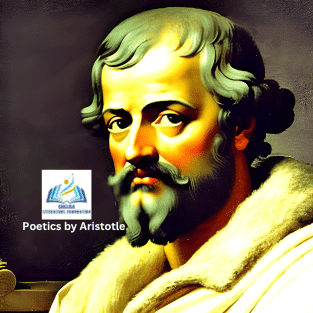"Poetics" by Aristotle: A Detailed Summary with Quoted Text
Introduction
Are you fascinated by the ancient art of storytelling? Do
you want to delve into the principles and techniques behind great works of
literature? Look no further than "Poetics" by Aristotle. In this
comprehensive summary, we will explore the key ideas presented by Aristotle in
his influential work. Drawing upon quotes from the book itself, we will uncover
Aristotle's thoughts on tragedy, plot structure, character development, and
more. So, let's embark on this intellectual journey and unlock the wisdom of "Poetics"
by Aristotle.
Poetics: The Essence of Greek Tragedy
"Poetics" by Aristotle is a timeless masterpiece
that delves deep into the nature of Greek tragedy. In this renowned work,
Aristotle presents a meticulous analysis of the essential elements that make
tragedies powerful and emotionally gripping. By examining the principles of
plot, character, thought, diction, melody, and spectacle, Aristotle provides us
with a comprehensive framework for understanding and appreciating dramatic
literature.
The Elements of Tragedy
1. Plot: The Soul of Tragedy
According to Aristotle, the plot is the backbone of a
tragedy. He asserts, "Tragedy, then, is an imitation of an action that is
serious, complete, and of a certain magnitude." Here, Aristotle emphasizes
the significance of a well-structured plot that engages the audience and
elicits emotional responses. He further highlights the importance of unity,
complexity, and catharsis in the plot development.
2. Character: The Human Element
In "Poetics," Aristotle highlights the importance
of well-developed characters in tragedies. He states, "Character gives us
qualities, but it is in our actions—what we do—that we are happy or the
reverse." According to Aristotle, characters should possess virtues and
flaws that shape their actions, leading to the progression of the plot and the
overall impact on the audience.
3. Thought: Insightful Reflections
Aristotle underscores the significance of thought or theme
in tragedies. He claims, "The plot ought to be so constructed that, even
without seeing the persons acting, one may infer what kind of persons they are
from their actions." This suggests that the actions and dialogue of
characters should reflect their inner thoughts, providing the audience with
insights into their motives and values.
4. Diction: The Power of Words
In "Poetics," Aristotle explores the role of
diction in tragedies. He states, "The most important thing of all is the
structure of the incidents." Aristotle emphasizes the careful selection
and arrangement of words, as they contribute to the emotional impact of a tragedy.
He emphasizes the significance of language in conveying the intended meaning
and evoking powerful emotions in the audience.
5. Melody: Harmonizing Emotions
While primarily focused on drama, Aristotle acknowledges the
role of melody in tragedies. He explains, "Melody is regarded as the most
potent of all the elements of Tragedy." Melody, when used appropriately,
enhances the emotional experience of the audience, creating a harmonious fusion
of words and music that amplifies the impact of the performance.
6. Spectacle: The Visual Element
Aristotle recognizes the importance of spectacle, which
refers to the visual aspects of a tragedy. He states, "Tragedy is an
imitation, not only of a complete action but of events inspiring fear or
pity." Spectacle includes visual effects, costumes, stage design, and the
overall presentation. Aristotle argues that while spectacle can enhance the
emotional effect, it should never overshadow the essence of the plot and
characters.
Conclusion
"Poetics" by Aristotle is a seminal work that
offers profound insights into the art of storytelling, particularly Greek
tragedy. Aristotle's examination of the essential elements of tragedy—plot,
character, thought, diction, melody, and spectacle—provides a timeless
framework for analyzing and appreciating dramatic literature. By understanding
the principles outlined in "Poetics," we can gain a deeper
appreciation for the emotional impact and enduring power of great works of
literature.
Frequently Asked Questions (FAQs)
1. What is the main focus of "Poetics" by
Aristotle?
The main focus of "Poetics" is to analyze and
define the essential elements of Greek tragedy, including plot, character,
thought, diction, melody, and spectacle. Aristotle seeks to provide a
comprehensive understanding of the art of storytelling and its emotional impact
on the audience.
2. Why is the plot considered crucial in tragedies?
According to Aristotle, the plot is the soul of a tragedy. A
well-structured plot engages the audience, creates suspense, and triggers
emotional responses. Unity, complexity, and catharsis are vital aspects of a
powerful plot that leaves a lasting impression on the audience.
3. How does Aristotle define the role of character in
tragedies?
Aristotle believes that characters in tragedies should
possess virtues and flaws that drive their actions. He asserts that it is
through actions that characters reveal their true nature and impact the
progression of the plot. Well-developed characters contribute to the overall
impact and emotional resonance of a tragedy.
4. What is the significance of thought or theme in
tragedies?
Thought or theme provides insightful reflections within
tragedies. Aristotle suggests that the actions and dialogue of characters
should offer glimpses into their inner thoughts and motivations. This allows
the audience to infer the nature of the characters and engage with the
underlying ideas conveyed by the playwright.
5. How does Aristotle emphasize the importance of diction
in tragedies?
Aristotle considers diction, the selection and arrangement
of words, to be of utmost importance in tragedies. Language has the power to
evoke emotions and convey meaning effectively. Carefully chosen words
contribute to the overall impact of a tragedy and help create a powerful
emotional connection with the audience.
6. What is the role of spectacle in tragedies, according
to Aristotle?
Spectacle refers to the visual aspects of a tragedy,
including stage design, costumes, and visual effects. Aristotle acknowledges
its significance but warns against spectacle overpowering the essence of the
plot and characters. Spectacle should enhance the emotional experience without
detracting from the core elements of the tragedy.

